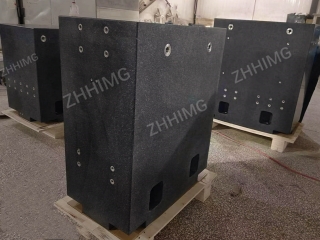In printed circuit board (PCB) manufacturing, precision and stability are critical. The granite bed is one of the key components that significantly improves the performance of PCB punching machines. Using granite in these machines is more than just a trend; it's a strategic choice with numerous advantages.
Granite is known for its excellent stiffness and density, which are key factors in maintaining stability during the punching process. When a PCB punching machine is operating, it is subject to various forces and vibrations. Granite machine beds effectively absorb these vibrations, minimizing potential movement that could cause the punching process to be inaccurate. This stability ensures precise alignment of punch holes, which is critical to the functionality of the final PCB product.
In addition, the granite bed is resistant to thermal expansion. This feature is critical in environments with frequent temperature fluctuations. Unlike other materials that may expand or contract with temperature changes, granite maintains its dimensions, ensuring consistent performance over the long term. This stability is crucial for high-volume production, as even the slightest deviation can lead to serious quality issues.
Additionally, a granite bed is easy to maintain and clean. Its non-porous surface prevents the accumulation of dust and debris that could affect machine operation. This level of cleanliness not only extends the life of the machine, but also helps improve the overall quality of the PCBs produced.
In summary, integrating a granite bed into a PCB punching machine is a game changer. Granite bed increases the accuracy and efficiency of the PCB manufacturing process by providing superior stability, resistance to thermal expansion and ease of maintenance. The importance of this innovation cannot be overstated as the industry continues to evolve, making granite an indispensable material in modern PCB production.
Post time: Jan-14-2025

